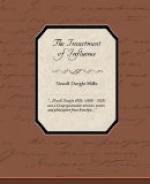The time-principle holds equally in man’s social and industrial life. To-day our colleges have their anthropological departments and our cities their museums. The comparative study of the dress, weapons, tools, houses, ships of savage and civilized races gives an outline view of the progress of society. How fragile and rude the handiwork of savages! How quickly are the wants provided for! A few fig leaves make a full summer suit for the African and the skin of an ox his garb for winter. But civilized man must toil long upon his loom for garments of wool and fine silk. Slowly the hollow log journeys toward the ocean steamer; slowly the forked stick gives place to the steam-plow, the slow ox to the swift engine; slowly the sea-shell, with three strings tied across its mouth, develops into the many-mouthed pipe-organ. But if rude and low conveniences represent little time and toil, these later inventions represent centuries of arduous labor. In his history of the German tribes, Tacitus gives us a picture of a day’s toil for one of the forest children. Moving to the banks of some new stream, the rude man peels the bark from the tree and bends it over the tent pole; with a club he beats down the nuts from the branches; with a round stone he knocks the squirrel from the bough; another hour suffices for cutting a line from the ox’s hide and, hastily making a hook out of the wishbone of the bird, he draws the trout from its stream. But if for savage man a day suffices for building and provisioning the tent, the accumulated wisdom of centuries is required for the home of to-day. One century offers an arch for the door, another century offers glass windows, another offers wrought nails and hinges, another plaster that will receive and hold the warm colors, another offers the marble, tapestry, picture and piano, the thousand conveniences for use and beauty.
Husbandry also represents patience and the labor of generations. Were it given to the child, tearing open the golden meat of the fruit, to trace the ascent of the tree, he would see the wild apple or bitter orange growing in the edge of the ancient forest. But man, standing by the fruit, grafted it for sweetness, pruned it for the juicy flow, nourished it for taste and color. Could he who picks the peach or pear have this inner vision, he would behold an untold company of husbandmen standing beneath the branches and pointing to their special contributions. The fathers labored, the children entered into the fruitage of the labor in his dream; the poet slept in St. Peter’s and saw the shadowy forms of all the architects and builders from the beginning of time standing about him and giving their special contributions to Bramante and Angelo’s great temple. Thus many hands have toiled upon man’s house, man’s art, industry, invention.




